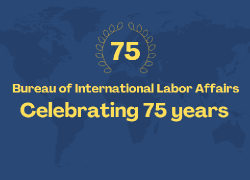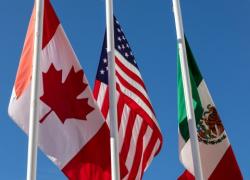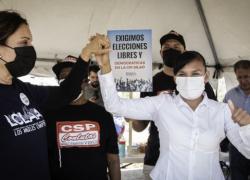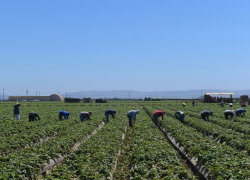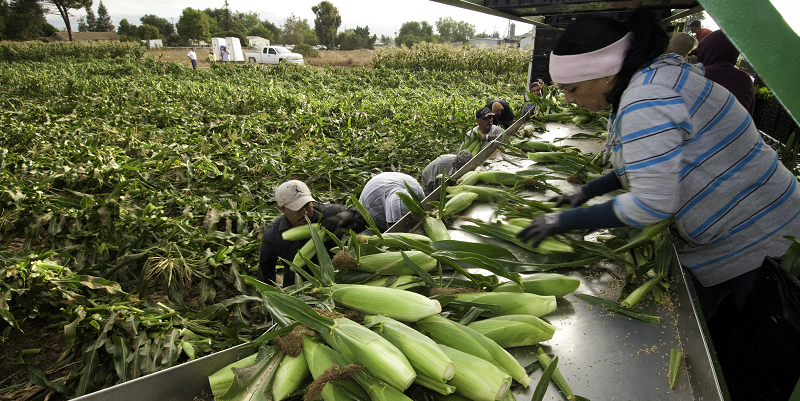
On Dec. 18, we observed International Migrants Day – a day dedicated to highlight the contributions of migrant workers and advocate for the full realization of their rights. We at the U.S. Department of Labor are committed to ensuring that all workers in the U.S., including migrant workers, have quality working conditions and their rights on the job are protected.
The U.S.-Mexico-Canada Agreement (USMCA), the first free trade agreement ever to contain specific provisions focused on migrant worker protections, helps us deliver on that commitment and ensure that rights and protections connect across borders and legal jurisdictions, following workers from when they are recruited to when they are on the job and until they return home.
It also includes historic provisions to promote gender equity and address discrimination. This is particularly important given that most people working in the U.S. under the agricultural (H-2A) and non-agricultural (H-2B) temporary work programs are from Mexico, and women migrant workers report facing issues such as gender discrimination and sexual harassment.
The Labor Department’s Bureau of International Labor Affairs has a team dedicated to monitoring and enforcing these and other USMCA provisions. The bureau works closely with other U.S. government agencies to strengthen working conditions in the U.S., promote racial and gender equity, and ensure fair and ethnical recruitment practices for migrant workers. We do this because when we protect migrant workers from exploitation, address gender disparities, and combat discrimination and gender-based violence and harassment at work, we are creating safer, better working environments and raising standards for all workers.
Several agencies at the Labor Department jointly implement and enforce the laws governing temporary foreign worker programs, including the H-2A and H-2B visa programs. For example, the Employment and Training Administration administers the labor certification process to determine when foreign workers are needed. The Wage and Hour Division is responsible for investigating employer compliance with program obligations. During the past two fiscal years, the division concluded more than 800 investigations uncovering violations of these labor provisions, which resulted in nearly $12 million in back wages recovered for more than 14,500 workers, and more than $12 million in civil penalties assessed.
In October of this year, the Labor Department published a new final rule to strengthen protections for workers in the H-2A program and enhance the Wage and Hour Division’s enforcement against abuse, while modernizing the H-2A application and temporary labor certification process. This final rule strengthens protections for U.S. and Mexican H-2A workers, enhances enforcement capabilities, modernizes the process for determining the prevailing wage, improves housing standards, and provides clarity to employers and other stakeholders.
Other department agencies, including the Occupational Safety and Health Administration and the Women’s Bureau, also work to ensure that migrant workers of all genders and ethnicities are aware of and have access to full labor rights protections throughout the migration cycle, with particular attention to issues such as gender-based violence and harassment. And together with the Wage and Hour Division, they coordinate closely with the Mexican Embassy and its network of 50 consulates to connect workers to resources and remedies through the Consular Partnership Program.
Our joint work helps ensure that migrant workers know their rights and are protected on the job here in the U.S. We also recognize the importance of engaging community-based organizations, labor unions and migrant worker centers to reach migrant workers and ensure their rights are upheld. And we are working closely with the government of Mexico to facilitate safe, orderly and regular migration through a U.S.-Mexico bilateral working group on labor mobility.
All migrants deserve to be treated with respect and dignity at every step of their journey, and we are committed to ensuring that their labor rights are protected and that they have access to complaint mechanisms and redress if their rights are violated. Mexico is a close ally, one of our largest trading partners, and the country of origin of the majority of participants in U.S. temporary foreign worker programs. When Mexican citizens work in the U.S. they are entitled to protections under the U.S. labor laws that the Department enforces. The U.S. and Mexico will continue to collaborate under the USMCA to protect their rights and dignity.
Thea Mei Lee is the deputy undersecretary for international affairs. Follow ILAB on Twitter at @ILAB_DOL.
Avanzando los Objetivos de Protección de Trabajadores Migrantes del T-MEC
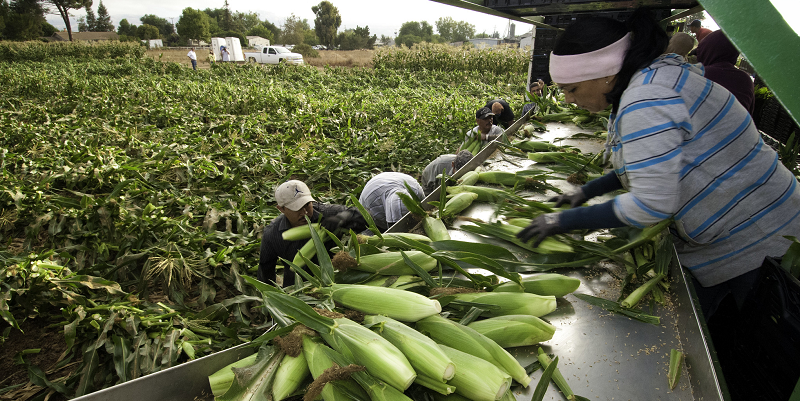
El 18 de diciembre, celebramos el Día Internacional del Migrante, un día dedicado a destacar las contribuciones de los trabajadores migrantes y abogar por la realización entera de sus derechos. En el Departamento de Trabajo estamos comprometidos a garantizar que todos los trabajadores en los Estados Unidos, incluso los trabajadores migrantes, tengan condiciones de trabajo de calidad y que sus derechos en el trabajo estén protegidos.
El Tratado entre los Estados Unidos de América, los Estados Unidos Mexicanos y Canadá, T-MEC o USMCA por sus siglas en inglés, es el primer tratado de libre comercio que contiene disposiciones específicas para la protección de los trabajadores migrantes, nos ayuda cumplir con ese compromiso y garantiza que los derechos y protecciones se conecten a través de las fronteras y las jurisdicciones legales, siguiendo a los trabajadores desde que son reclutados hasta que están en el trabajo y cuando regresen a casa.
También incluye disposiciones históricas para promover la equidad de género y abordar la discriminación. Esto es importante dado que la mayoría de las personas que trabajan en los Estados Unidos bajo los programas de trabajo temporal agrícola (H-2A) y no agrícola (H-2B) son de México, y las trabajadoras migrantes informan que enfrentan problemas como la discriminación de género y el acoso sexual.
La Oficina de Asuntos Laborales Internacionales del Departamento de Trabajo tiene un equipo dedicado a monitorear y hacer cumplir estas y otras disposiciones del T-MEC/USMCA. La oficina trabaja en colaboración con otras agencias del gobierno para fortalecer las condiciones de trabajo en el país, promover la equidad racial y de género y garantizar prácticas de reclutamiento justas y étnicas para los trabajadores migrantes. Hacemos esto porque cuando protegemos a los trabajadores migrantes de la explotación, abordamos las disparidades de género y combatimos la discriminación y la violencia de género y el acoso en el trabajo, estamos creando trabajo más seguros y mejores y elevando los estándares para todos los trabajadores.
Varias agencias del Departamento de Trabajo implementan y hacen cumplir conjuntamente las leyes que rigen los programas de trabajadores extranjeros temporales, incluidos los programas de visas H-2A y H-2B. Por ejemplo, la Administración de Empleo y Capacitación administra el proceso de certificación laboral para determinar la necesidad de trabajadores extranjeros. La División de Horas y Salarios es responsable de investigar el cumplimiento del empleador con las obligaciones del programa. Durante los últimos dos años fiscales, la división concluyó más de 800 investigaciones que descubrieron violaciones de estas disposiciones laborales, lo que resultó en casi $12 millones en salarios atrasados recuperados para más de 14,500 trabajadores y más de $12 millones en sanciones civiles.
En octubre de este año, el Departamento de Trabajo publicó una nueva regla para fortalecer las protecciones para los trabajadores en el programa H-2A y mejorar la aplicación de la División de Horas y Salarios contra el abuso, mientras moderniza la solicitud H-2A y el proceso de certificación laboral temporal. Esta regla fortalece las protecciones para los trabajadores H-2A estadounidenses y mexicanos, mejora las capacidades de cumplimiento, moderniza el proceso para determinar el salario prevaleciente, mejora los estándares de vivienda y brinda claridad a los empleadores y otras partes interesadas.
Otras agencias departamentales, incluida la Administración de Seguridad y Salud Ocupacional y la Oficina de la Mujer, también trabajan para garantizar que los trabajadores migrantes de todos los géneros y etnias conozcan y tengan acceso a protecciones completas de sus derechos laborales durante todo el ciclo migratorio, con atención a situaciones de violencia de género y el acoso. Y junto con la División de Horas y Salarios, coordinan con la Embajada de México y su red de 50 consulados para conectar a los trabajadores con recursos a través del Programa de Asociación Consular.
Nuestro trabajo conjunto garantiza que los trabajadores migrantes conozcan sus derechos y estén protegidos en el lugar de trabajo. También reconocemos la importancia de involucrar a las organizaciones comunitarias, sindicatos y centros de trabajadores migrantes para proveer información a los trabajadores migrantes y garantizar que se respeten sus derechos. Y estamos trabajando con el gobierno de México para facilitar la migración segura, ordenada y regular a través de un grupo de trabajo bilateral entre los Estados Unidos y México sobre movilidad laboral.
Todos los migrantes merecen ser tratados con respeto y dignidad en cada paso de su viaje, y estamos comprometidos a garantizar que sus derechos laborales estén protegidos y que tengan acceso a someter quejas y a reparaciones si se violan sus derechos. México es un aliado cercano, uno de nuestros mayores socios comerciales y el país de origen de la mayoría de los participantes en los programas de trabajadores extranjeros temporales. Cuando los ciudadanos mexicanos trabajan en los Estados Unidos, tienen derecho a protecciones bajo las leyes laborales de los Estados Unidos que el departamento hace cumplir. Los Estados Unidos y México continuarán colaborando bajo el T-MEC/USMCA, para proteger sus derechos y dignidad.
Thea Mei Lee es la subsecretaria adjunta de asuntos internacionales. Siga a ILAB en Twitter @ILAB_DOL.

 U.S. Department of Labor Blog
U.S. Department of Labor Blog
